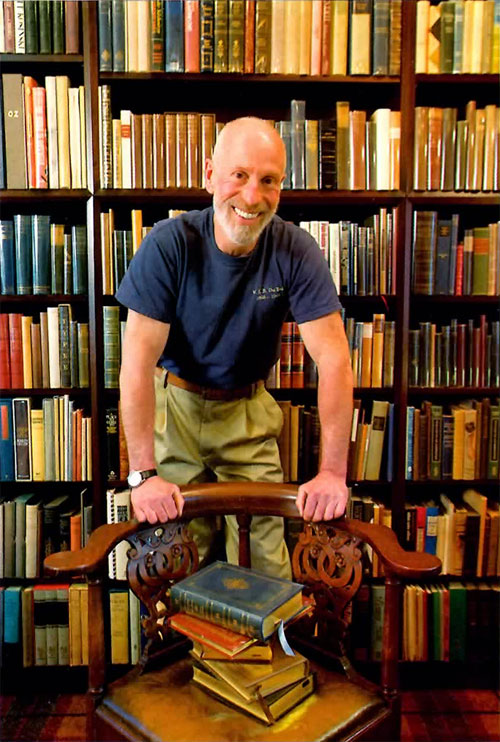On the Prowl: Berkshire booksellers never stop hunting
BY BOOK-TRADER STANDARDS, Eric Wilska started a little late in life—high school. According to him, his reading and collecting began in earnest with an old copy of an Ambrose Bierce book.
“When I went to college—you know how kids bring their clothes and bedding—well, I had a trunk full of books that I dragged around with me,” says Wilska, sorting a stack of newly published fiction. “I put it in my dorm room. It was my treasure.”
Wilska is the founder/owner of The Bookloft, an independent bookstore in Great Barrington, as well as Found, the store’s sister location in West Stockbridge that specializes in used, rare, and out-of-print books. Nearly 40 years after falling in love with books, he finds he is not alone—not by a long shot. The area is rife with hundreds of bibliophiles and serious collectors of one sort or the other, haunting library sales, estate sales, and, of course, bookstores, each searching for that certain gem to make their collection complete.
For David and Esther Kininmonth of Angus Books—a strictly online venture in Sheffield—that means knowing their product inside and out. “Fiction authors, of course. Sci-fi, cookbooks, history; I’ve even had to acquaint myself with religious books and nature books,” says David, himself an avid collector of all things locomotive. “You need ta broad, general knowledge. There’s not enough supply here to allow us to be a single-topic specialist dealer. There’s more potential for something like that in the big cities.”

Finding books to sell in the Berkshires is an adventure all its own, sometimes dangerous, sometimes musty, but always intriguing. According to Esther, she and her husband go “out in the field” almost every week to investigate book leads. “There is a formula to how we come across old books,” she says. “In the trade, it’s known as the three D’s: divorce, death, or departure. A majority of the places we visit are library sales, people’s homes. Or they come to us, which is rare.”
The Kininmonth’s never-ending search for good books has taken them to abandoned shacks, nursing homes, and the vast libraries of deceased bibliophiles (including, just recently, an IBM engineer whose collection yielded “some very good stuff”).
Admittedly, it’s all about the hung—and, according to Randy Weinstein, owner of North Star Rare Books in Great Barrington, the possibility of finding a gold mine in a sea of dust and yellowed pages. “People are hoarders and collectors. They like to treasure things,” he says, carefully replacing the dust jacket on a small Hemingway first edition. “Every bookseller is a book collector. I think of it as my brush with history. I used to try and get out of searching through attics and basements, but if there’s just that one gem…”
Actually, Weinstein has struck book gold on a few occasions. A John Lennon album cover inscribed by Truman Capote; Ulysses S. Grant’s copy of The Federalist Papers, annotated from Grant’s days at West Point; and Joseph Heller’s own copy of his book Catch 22, complete with a “couple of thousand annotations in Heller’s own hand, talking about the significance of the book.” But with all these beautifies, it is rare that Weinstein actually keeps anything for himself.
“I have some of the most amazing artifacts in the world in my possession,” he says. “I go through every single page of the books and look for notes, and take notes myself, to sort of encapsulate a person’s relationship to that book. I am a temporary guardian, and I have to let most of it go.”
That is, except for an original sketch of the parlor of the McLean house at Appomattox,Virginia, where General Lee surrendered to General Grant on Palm Sunday, 1865. On a yellowed piece of paper that looks more like a rough sketch of how someone would design a living room, rather than a rendering of a monumental event, the names of several men sitting at that very location, in that parlor, on the day of the surrender are scrawled in ink. Drawn by Ely S. Parker, a Seneca chief and Union general, this map is a simple artifact weighted with history and, as Weinstein gravely notes, “It’s magical.”

